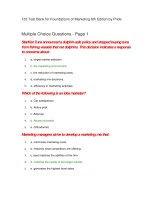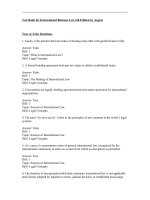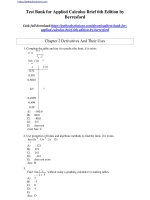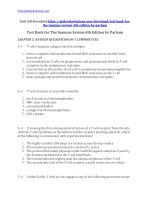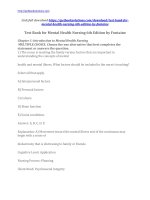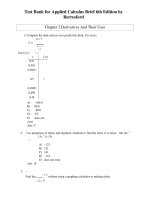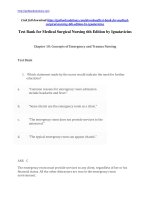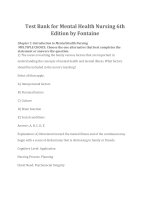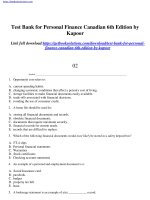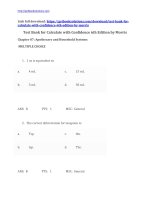Test bank for research methods for the behavioral sciences 6th edition by gravetter
Bạn đang xem bản rút gọn của tài liệu. Xem và tải ngay bản đầy đủ của tài liệu tại đây (217.98 KB, 13 trang )
Test Bank for Research Methods for the Behavioral Sciences 6th Edition by Gravetter
Full
file at />Name:
Class:
Date:
Chapter 01
Multiple Choice
1. When you “know” that you do not want to eat chocolate-covered crickets, even when everyone around you says that
they taste great, your decision is based on the method of ____.
a. empiricism
b. faith
c. tenacity
d. authority
ANSWER: c
2. A student who believes that his or her performance on tests is influenced by wearing a lucky hat is using the method
of ____.
a. empiricism
b. faith
c. tenacity
d. authority
ANSWER: c
3. A person who buys a lottery ticket because s/he just feels lucky is using the method of ____.
a. empiricism
b. faith
c. tenacity
d. intuition
ANSWER: d
4. Which method of acquiring knowledge is being used when people make decisions based on instinct or hunches?
a. intuition
b. rationalism
c. tenacity
d. authority
ANSWER: a
5. What is a potential problem with the method of authority?
a. A person may claim to be an expert when he or she really is not.
b. An “expert” answer may be only a personal, subjective opinion.
c. An expert may be giving answers outside his or her area of expertise.
d. The other three choices are all potential problems.
ANSWER: d
Copyright Cengage Learning. Powered by Cognero.
Full file at />
Page 1
Test Bank for Research Methods for the Behavioral Sciences 6th Edition by Gravetter
Full
file at />Name:
Class:
Date:
Chapter 01
6. Using a sports star to sell clothing in a television commercial relies upon which nonscientific method of acquiring
knowledge?
a. the method of tenacity
b. the method of authority
c. the empirical method
d. the rational method
ANSWER: b
7. Looking up your local weather report online is an example of using the ____.
a. empirical method
b. rational method
c. method of authority
d. scientific method
ANSWER: c
8. Which method of acquiring knowledge is being used by students who are learning from teachers and textbooks?
a. empiricism
b. rationalism
c. method of authority
d. scientific method
ANSWER: c
9. The mode of inquiry that is called the method of faith is a variant of which other method of inquiry?
a. empiricism
b. rationalism
c. the method of authority
d. the scientific method
ANSWER: c
10. Marisol just found out she is pregnant and tells everyone that she has a feeling she will have a girl. In this case,
Marisol is using the ____.
a. method of authority
b. rational method
c. empirical method
d. method of intuition
ANSWER: d
Copyright Cengage Learning. Powered by Cognero.
Full file at />
Page 2
Test Bank for Research Methods for the Behavioral Sciences 6th Edition by Gravetter
Full
file at />Name:
Class:
Date:
Chapter 01
11. A young child believing everything that her kindergarten teacher says to be true is an example of ____.
a. the method of faith
b. the rational method
c. the empirical method
d. the method of intuition
ANSWER: a
12. Last year Tomas and his friend Jamie were both too short to ride the rollercoaster. Jamie went to the park this year
and was tall enough to ride. Because Tomas is taller than Jamie, he thinks that he will be able to ride the rollercoaster
as well. Tomas is using the ____ to answer his question.
a. method of empiricism
b. rational method
c. method of authority
d. scientific method
ANSWER: b
13. An explanation is rational if it is based on ____.
a. widely held beliefs
b. logical deductions
c. evidence of the senses
d. respect for the source of the explanation
ANSWER: b
14. Which potential problem can occur when the rational method is used?
a. People are not necessarily very good at logical reasoning.
b. It requires hands-on experience, so it can be messy or even dangerous.
c. There is no mechanism for testing the accuracy of the claims.
d. This method requires lengthy and difficult testing.
ANSWER: a
15. Kenji believes that food poisoning causes food aversions, so when he finds out that his friend Brielle hates seafood, he
assumes that Brielle must have had food poisoning after eating seafood sometime in her past. Kenji is using the ____.
a. method of empiricism
b. rational method
c. method of tenacity
d. scientific method
ANSWER: b
Copyright Cengage Learning. Powered by Cognero.
Full file at />
Page 3
Test Bank for Research Methods for the Behavioral Sciences 6th Edition by Gravetter
Full
file at />Name:
Class:
Date:
Chapter 01
16. An artist tries putting a freshly painted canvas outside during a rainstorm to see how the painting will change from the
pattern of the raindrops. Which method of acquiring knowledge is she using?
a. method of empiricism
b. rational method
c. method of authority
d. scientific method
ANSWER: a
17. Visual illusions, such as the vertical/horizontal illusion, provide a demonstration of one problem with the ____ method
of knowing or acquiring knowledge.
a. rational
b. authority
c. empirical
d. scientific
ANSWER: c
18. When your doctor uses a stethoscope to listen to your heart, the doctor is gathering information by using the ____.
a. method of authority
b. rational method
c. empirical method
d. method of intuition
ANSWER: c
19. An explanation is empirical if it is based on ____.
a. widely held beliefs
b. logical deductions
c. evidence of the senses
d. respect for the source
ANSWER: c
20. A limitation of using the method of empiricism is that ____.
a. people are generally not very good at reasoning
b. while perception is typically accurate, sensation is not
c. the process can be time consuming and often risky
d. there is no mechanism for validating conclusions
ANSWER: c
Copyright Cengage Learning. Powered by Cognero.
Full file at />
Page 4
Test Bank for Research Methods for the Behavioral Sciences 6th Edition by Gravetter
Full
file at />Name:
Class:
Date:
Chapter 01
21. A limitation of using the rational method is that ____.
a. there is no method for correcting erroneous ideas
b. there is no way to separate accurate from inaccurate knowledge
c. people often accept an expert’s statement without question
d. people are generally not very good at reasoning
ANSWER: d
22. When people make an observation, then form a hypothesis that explains the observation, and then make more
observations to test the credibility of the hypothesis, they are using the ____.
a. empirical method
b. rational method
c. scientific method
d. method of authority
ANSWER: c
23. Which of the following statements accurately describes the scientific method?
a. It involves hypotheses rather than predictions.
b. It relies solely on deductive reasoning.
c. It is a circular process that leads to a tentative answer.
d. It effectively combines intuition with empirical data.
ANSWER: c
24. What kind of reasoning uses a general statement to make conclusions about specific examples?
a. inductive
b. deductive
c. scientific
d. predictive
ANSWER: b
25. What kind of reasoning uses a few specific observations to produce a statement about a larger possible set of
observations?
a. inductive
b. deductive
c. scientific
d. predictive
ANSWER: a
Copyright Cengage Learning. Powered by Cognero.
Full file at />
Page 5
Test Bank for Research Methods for the Behavioral Sciences 6th Edition by Gravetter
Full
file at />Name:
Class:
Date:
Chapter 01
26. Using observations of a small number of humans to make a statement about human behavior in general is an example
of ____ reasoning.
a. inductive
b. deductive
c. practical
d. predictive
ANSWER: a
27. Based on observations of his own children, Jean Piaget formed a theory about the cognitive development of all
children. This is an example of ____ reasoning.
a. inductive
b. deductive
c. practical
d. predictive
ANSWER: a
28. A hypothesis is a ____ statement and a prediction is a ____ statement.
a. specific; general
b. specific; specific
c. general; specific
d. general; general
ANSWER: c
29. The third step of the scientific method uses a general hypothesis to develop a testable predication. This step involves
the use of ____.
a. induction
b. deduction
c. analysis
d. synthesis
ANSWER: b
30. In the scientific method, a prediction is evaluated by ____.
a. making systematic, planned observations
b. determining the hypothesis of best fit
c. logically evaluating the implications
d. using it to explain established phenomena
ANSWER: a
Copyright Cengage Learning. Powered by Cognero.
Full file at />
Page 6
Test Bank for Research Methods for the Behavioral Sciences 6th Edition by Gravetter
Full
file at />Name:
Class:
Date:
Chapter 01
31. What is meant by the saying, “science is empirical?”
a. Scientific answers are based on direct observation.
b. Scientific answers are based on deductive reasoning.
c. Scientific answers are based on inductive reasoning.
d. Scientific answers are made available for evaluation by others.
ANSWER: a
32. The phrase “science is objective” means that scientific answers are ____.
a. based on direct observation
b. based on logical reasoning
c. not influenced by researcher bias
d. made available for evaluation by others
ANSWER: c
33. Publicly repeating a study by copying the methods exactly is referred to as ____.
a. empiricism
b. replication
c. control
d. tenacity
ANSWER: b
34. Tiffany is researching methods used to treat autism spectrum disorders and begins by searching on the Internet.
Which statement should make her suspicious that she is on a site rooted in pseudoscience?
a. The website focuses on testimonials from family members that describe seemingly miraculous cures.
b. The site contains links to research published in peer-reviewed journals that evaluate the treatment method.
c. The treatment methods described on the site are clearly defined, as are the expected outcomes.
d. The site provides clear explanations of how the treatment methods are tied to existing theories of the causes of
autism.
ANSWER: a
35. A distinction between science and pseudoscience is that ____.
a. science focuses on the theoretical, not the practical
b. science is based on hypotheses that are testable and refutable
c. science examines a topic that has never been investigated
d. science aims to make definite conclusions about a topic
ANSWER: b
Copyright Cengage Learning. Powered by Cognero.
Full file at />
Page 7
Test Bank for Research Methods for the Behavioral Sciences 6th Edition by Gravetter
Full
file at />Name:
Class:
Date:
Chapter 01
36. Lowell is very concerned about his grandmother, who has recently been diagnosed with dementia. He wants to learn
more about it, and checks out the jacket quotes on some currently popular books. Which quote should reassure him
that the book is based in science rather than pseudoscience?
a. “This book saved my wife from a lonely death in a nursing home!”
b. “Big Pharma does not want you to know about curing dementia!”
c. “From laboratory research to clinical trials: evaluating the treatment of dementia.”
d. “Find out what REALLY causes dementia and why health agencies do not care.”
ANSWER: c
37. Pseudoscience is based on ____.
a. testable hypotheses
b. objective evidence
c. subjective evidence
d. refutable hypotheses
ANSWER: c
38. How do quantitative research and qualitative research differ?
a. they generate different types of data
b. they rely on different nonscientific ways of knowing
c. one type involves data collection while the other does not
d. one type relies on hypotheses while the other relies on predictions
ANSWER: a
39. A researcher conducts a study in which 50 rats are assigned to different treatments and tested. In the study, the rats
are called research ____.
a. associates
b. cohorts
c. participants
d. subjects
ANSWER: d
40. A researcher conducts a study in which 50 college students are assigned to different treatments and tested. In the
study, the students are called ____.
a. associates
b. cohorts
c. participants
d. subjects
ANSWER: c
Copyright Cengage Learning. Powered by Cognero.
Full file at />
Page 8
Test Bank for Research Methods for the Behavioral Sciences 6th Edition by Gravetter
Full
file at />Name:
Class:
Date:
Chapter 01
41. If you are a psychologist embarking on a research study, what should you do first?
a. identify an idea and search the literature to form the research question
b. form a testable, refutable hypothesis based on current theories
c. decide which individuals should participate and how they should be recruited
d. select a research and analytic strategy based on what is typically used
ANSWER: a
True / False
42. A football player who knows that his performance will be better if he wears his lucky shirt is using the method of
faith.
a. True
b. False
ANSWER: False
43. Finding information in a textbook is an example of using the rational method of inquiry.
a. True
b. False
ANSWER: False
44. Dallas is using the rational method when, upon seeing that birds eating certain berries do not die, concludes that the
berries are not poisonous.
a. True
b. False
ANSWER: True
45. Clinton is using the empirical method when he decides to eat a handful of berries to see if they are poisonous.
a. True
b. False
ANSWER: True
46. You have a terrible toothache, so you visit a dentist to find out what is wrong with your tooth. This is an example of
using the method of authority.
a. True
b. False
ANSWER: True
47. The method of intuition can be valuable when making ethical or moral decisions by doing what “feels” right.
a. True
b. False
ANSWER: True
Copyright Cengage Learning. Powered by Cognero.
Full file at />
Page 9
Test Bank for Research Methods for the Behavioral Sciences 6th Edition by Gravetter
Full
file at />Name:
Class:
Date:
Chapter 01
48. You have dinner reservations at 7:30 at a restaurant that is 30 minutes away and it is already 7:20, leading you to
conclude that you are going to be late. This is an example of using the empirical method.
a. True
b. False
ANSWER: False
49. Based on a few students whom you know, you decide that art majors wear funky clothes and that physics majors tend
to be nerds. This is an example of inductive reasoning.
a. True
b. False
ANSWER: True
50. Part of the scientific method involves using a hypothesis to make predictions.
a. True
b. False
ANSWER: True
51. Using a hypothesis to predict how people will behave demonstrates the use of induction.
a. True
b. False
ANSWER: False
52. In the scientific method, the process of forming a hypothesis means that you are trying to find a possible explanation
for the phenomenon that you have observed.
a. True
b. False
ANSWER: True
53. If the scientific method is being used to evaluate a hypothesis predicting a specific relationship between two variables,
then it is essential that both variables can be measured.
a. True
b. False
ANSWER: True
54. An important element of the scientific method is that research results should be made public.
a. True
b. False
ANSWER: True
Copyright Cengage Learning. Powered by Cognero.
Full file at />
Page 10
Test Bank for Research Methods for the Behavioral Sciences 6th Edition by Gravetter
Full
file at />Name:
Class:
Date:
Chapter 01
55. Research participants must be informed of all relevant aspects of the study, including any risks or dangers that may be
involved.
a. True
b. False
ANSWER: True
56. Pseudoscience is based on objective, empirical evidence.
a. True
b. False
ANSWER: False
57. In the scientific method, the actual research study is not done until after the researcher has formed a hypothesis and
made a specific prediction.
a. True
b. False
ANSWER: True
58. One critical component of the scientific method is that all answers or explanations must be demonstrated empirically.
a. True
b. False
ANSWER: True
59. A good hypothesis should make a statement about the existence of a relationship, a difference, or a treatment effect.
a. True
b. False
ANSWER: True
60. Humans who participate in a research study are properly called research subjects.
a. True
b. False
ANSWER: False
61. One difference between a scientific answer and answers gained by other methods is that the scientific answer is
more likely to be an absolute or final answer.
a. True
b. False
ANSWER: False
Copyright Cengage Learning. Powered by Cognero.
Full file at />
Page 11
Test Bank for Research Methods for the Behavioral Sciences 6th Edition by Gravetter
Full
file at />Name:
Class:
Date:
Chapter 01
Essay
62. Describe a problem that can arise when you are trying to obtain information using only the method of authority. How
is this problem avoided in the scientific method?
ANSWER: Potential problems with the method of authority are (1) that the expert may not really be an expert or
may be providing information outside his or her area of expertise, and (2) that the method does not
include any mechanism to verify the information. These problems are corrected in the scientific method
because the results are always verified by an empirical demonstration.
63. Describe how the rational method and the method of empiricism are both utilized as parts of the scientific method.
ANSWER: The rational method is used to develop a hypothesis based on observations (inductive reasoning) and
when the hypothesis is used to make predictions (deductive reasoning) that will be tested. The method of
empiricism is used when scientists make systematic, planned observations to evaluate the predictions
from their hypothesis.
64. Distinguish between induction and deduction and describe how each is used in the scientific method.
ANSWER: Induction involves using a few specific observations as the basis for forming a general statement about
all possible observations. In the scientific method, researchers use inductive reasoning to form a general
hypothesis that is based on a small number of initial observations. Deduction involves using a general
statement to make predictions about specific examples. In the scientific method, researchers use a
general hypothesis to predict what should occur when the make systematic, planned observations in a
research study; that is, when specific individuals are observed in a specific situation.
65. Identify the basic steps in the scientific method, and describe how the scientific method is used to answer questions
such as, “Why are some marriages successful and others are not?”
ANSWER: After observing that some marriages are successful and some are not (step 1), you would develop a
hypothesis to try to explain the phenomenon (step 2). For example, it is possible that good
communication within a marriage leads to success whereas poor communication leads to failure. Based
on this hypothesis, you would make a specific research prediction (step 3). For example, if you selected
50 married couples and asked each couple to rate their level of communication and the overall quality of
their marriage, you should find a strong relationship between the two variables. Next, you would
empirically evaluate the hypothesis by actually selecting 50 couples and observing the two variables
(step 4). Based on the outcome of the observations in step 4, you could either reject the hypothesis (if it
is not communication, it could be some other factor) or you could refine the original hypothesis, for
example trying to determine what factors lead to good (or bad) communication within a marriage (step
5).
66. Explain what it means to say that the scientific method or the research process can be viewed as a never-ending
circle or a spiral of steps rather than a linear process that leads to an end.
ANSWER: Research always produces tentative answers. It is always understood that new information may appear
tomorrow that changes the way we think about behavior today. The results from one research study
usually generate new questions for future research, or the results may be challenged or tested by
additional research. Thus, the “end” of one research study is usually the beginning for other studies, and
the cycle continues.
Copyright Cengage Learning. Powered by Cognero.
Full file at />
Page 12
Test Bank for Research Methods for the Behavioral Sciences 6th Edition by Gravetter
Full
file at />Name:
Class:
Date:
Chapter 01
67. Distinguish between science and pseudoscience.
ANSWER: Science is based on evidence gathered from systematic and objective observations. Pseudoscience tends
to rely on subjective evidence, anecdotal reports, and a few hand-picked examples of success. Science
examines hypotheses and theories that can be tested and refuted. As a result, scientific theories are
open to change or revision when new results contradict old ideas. Pseudoscience typically does not
acknowledge or accept negative results, and does not change or evolve.
68. How do quantitative and qualitative research differ?
ANSWER: The major difference between quantitative and qualitative research is the type of data they gather.
Quantitative studies typically gather numerical scores that can be summarized, analyzed, and interpreted
using standard statistical procedures. In contrast, qualitative studies typically generate narrative reports
of observations.
Copyright Cengage Learning. Powered by Cognero.
Full file at />
Page 13
